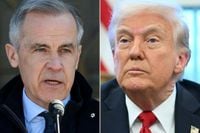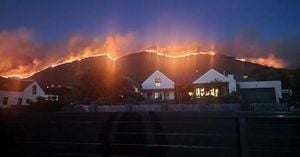Millions of Canadians are casting their ballots today in a closely watched federal election that could reshape the political landscape of the country. As Prime Minister Mark Carney seeks a renewed mandate and Conservative leader Pierre Poilievre mounts a formidable challenge, voters are deciding on a future path amid escalating tensions with the United States and pressing domestic economic concerns. The results, expected late tonight or early Tuesday morning, will determine whether Carney's Liberal Party maintains power, potentially with a majority, or whether Canada enters a period of political uncertainty with a minority government.
This election unfolds against the backdrop of heightened U.S.-Canada tensions, largely driven by the rhetoric of U.S. President Donald Trump. His threats of imposing tariffs on Canadian goods and provocative suggestions that Canada should become the "51st state" have fueled nationalist sentiment across the border. Political science professor Tom Urbaniak noted, "Donald Trump is the ghost hanging over this election," highlighting how Trump's remarks have sharpened public anxieties and bolstered support for Carney's Liberals, who are perceived as less aligned with Trump than their Conservative rivals.
Polling indicates that the Liberals hold a commanding lead, though a landslide victory seems unlikely. According to CBC News' projection model, the Liberals have a 74 percent chance of forming a majority government, with projections showing around 190 seats—just above the 172 needed for a majority in the 343-seat House of Commons. However, if the Liberals fall short of a majority, they may need to rely on the Bloc Québécois to govern, which could prove unstable over time.
As Canadians head to the polls on April 28, 2025, they are not just voting for their next Prime Minister but also making a statement about their stance on Trump's influence. The election comes in the wake of a deadly car-ramming attack in Vancouver, which has further complicated the political landscape.
The initial results of the poll race will start coming in after 7:30 PM EST (5:00 AM IST Tuesday), with the largest portion of the electorate—including key battlegrounds Ontario and Quebec—seeing polls close at 8:30 PM EST. A poll by Abacus Data published on April 27, 2025, found that the Liberals were ahead with 41 percent of the vote compared to 39 percent for the Conservatives.
Carney, who took over as Prime Minister just last month after Justin Trudeau's resignation, has positioned himself as a steady hand in a turbulent time, promising to stand up against Trump's threats. He has emphasized his experience as a former central banker, pledging to navigate the country through economic challenges exacerbated by Trump's aggressive trade policies.
On the other hand, Poilievre has campaigned with Trump-like bravado, attempting to focus on domestic issues that have made Trudeau increasingly unpopular, particularly rising living costs. However, the emergence of Trump as a dominant issue has complicated his campaign, as many Canadians express concerns about the implications of aligning too closely with the U.S. President.
Trump's influence was palpable during the campaign, as he reiterated his desire for Canada to become the "cherished 51st state," claiming it would lead to "ZERO TARIFFS" and "FREE ACCESS WITH NO BORDER." These remarks have drawn sharp backlash from Canadian leaders, including Poilievre, who cautioned Trump against meddling in Canada’s internal affairs. "The only people who will decide the future of Canada are Canadians at the ballot box," Poilievre stated, reinforcing a message of national sovereignty.
As the election draws closer, the stakes have never been higher. Canada faces significant challenges, with over 75 percent of its exports going to the U.S. Trump's threats to impose sweeping tariffs could severely damage the Canadian economy, prompting both Carney and Poilievre to promise accelerated negotiations on a free trade deal with the U.S. to mitigate the uncertainty.
The election is also a referendum on the political direction of Canada, as voters weigh the potential benefits of a Conservative government against the risks of aligning too closely with Trump's administration. Political analysts have noted that the outcome could have lasting implications for Canada's relationship with its southern neighbor.
As the polls begin to close, the attention of the nation—and indeed the world—turns to the results. With the backdrop of a cost-of-living crisis and rising nationalistic sentiments, Canadians are faced with a choice that could define the future of their country.
In the lead-up to the election, both parties have ramped up their campaigns, with Carney leveraging his experience and positioning as an anti-Trump candidate, while Poilievre has attempted to rally support by addressing domestic concerns. The political landscape has shifted dramatically over the past few months, with Carney's rise coinciding with Trump's re-election and subsequent threats.
As Canadians cast their votes, they are not only choosing their next leader but also expressing their stance on the broader issues of national identity and sovereignty in the face of external pressures. The results will be a crucial indicator of how Canadians view their future, particularly in relation to the United States.
With the election results expected to trickle in late tonight, all eyes are on Canada as it navigates this pivotal moment in its history. Will the Liberals retain power, or will the Conservatives emerge victorious, ushering in a new era of governance? The answer may redefine Canadian politics for years to come.





